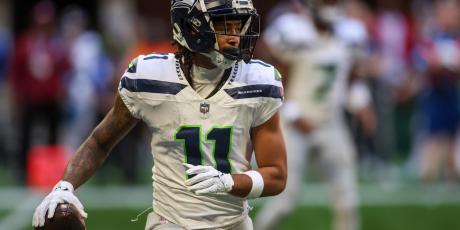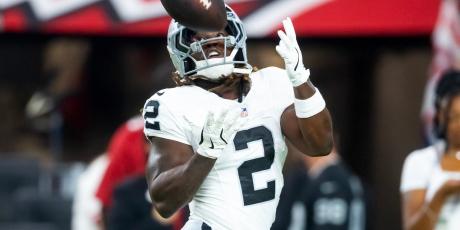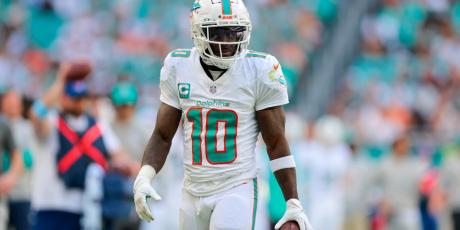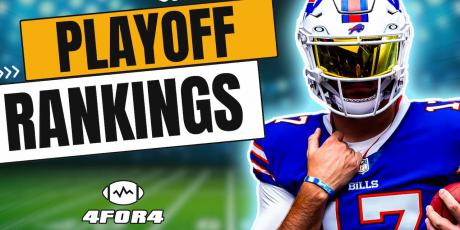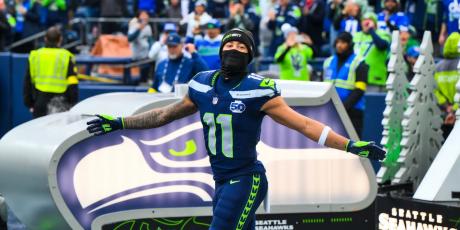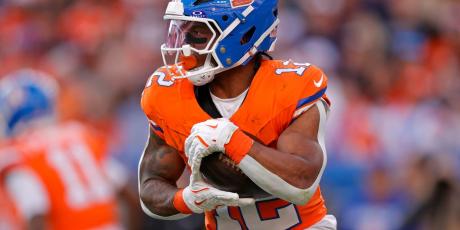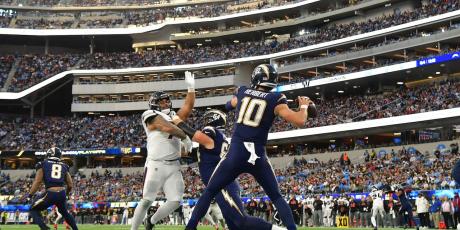Fantasy Debate: Julio Jones vs George Kittle

George Kittle and Julio Jones are going within five picks of each other on platforms such as FFPC. In this debate, 4for4's Eric Moody will argue for the wide receiver while Alex Gelhar takes the tight end side.
The Case for Julio Jones
Eric: Jones was selected No. 6 overall by the Falcons back in 2011 out of the University of Alabama. It’s safe to say that he exceeded the expectations of the team’s fanbase. Jones is a seven-time Pro Bowler (2012, 2014-2019) who has accumulated 1,000 or more receiving in seven of nine seasons and has surpassed 1,394 receiving yards in each of the last six seasons. He led the NFL in receptions (136) and receiving yards (1,871) in 2015. Jones was also the receiving yards leader in 2018 with 1,677 yards. Were you aware that he was named the most efficient receiver over the last decade in connection with Pro Football Focus’ yards per route run metric?
Many consider Julio Jones to be the best receiver in football, and they won't get an argument here.
Here's a thread on his 2019 season. pic.twitter.com/0GvQ0MlkCr— Johnny Kinsley (@Brickwallblitz) June 11, 2020
Jones is a generational talent and from a fantasy perspective, he has been active in 126 games and finished as a WR2 or better in 59% of his game in half-point PPR formats. Jones has averaged 10 targets, 6.3 receptions, 96.2 receiving yards, and 123.7 air yards per in his career. He’s the fastest player in NFL history to reach 10,000 career receiving yards and is the Falcons all-time career receiving yards leader. Jones also broke Hall of Fame receiver Jerry Rice’s longstanding record and became the player to reach 12,000 career receiving yards in the fewest number of games. He reached that milestone in 17 fewer games than Rice did.
Atlanta rewarded Jones with a three-year, $66 million extension, all of which is guaranteed. He is now the highest-paid receiver in regard to his average annual salary and guaranteed money. Jones’ presence has also had a positive impact on Falcons quarterback Matt Ryan over the last decade. The 35-year old quarterback has averaged 287.6 passing yards and 21 fantasy points per game since Jones’ rookie season. The only other quarterbacks with a higher number of passing yards per game over that time frame with over 50 starts are Peyton Manning (295) and Drew Brees (308). Ryan is the only quarterback to top 4,000 passing yards in each of the nine seasons since Jones as drafted. It is easy to overlook him in fantasy drafts because the Falcons have gone 7-9 in each of the last two seasons, but Atlanta’s passing game will continue to run through Jones. He’s 16 fantasy points per game in half-point PPR formats ni that span. Jones is only 31-year old and still in his physical prime. It is not out of the realm of possibility that he finishes as a top-three fantasy receiver.
49ers tight end George Kittle has some impressive statistical production over the last two seasons. He’s averaged 8.1 targets, 5.8 receptions, 81 receiving yards, 53.5 air yards, and 13.2 fantasy points per game in half-point PPR formats. The only other players over that time frame with a higher number of receiving yards per game than Kittle were Tyreek Hill (83.5), Antonio Brown (84.6), DeAndre Hopkins (88.3), Davante Adams (88.3), Mike Evans (92.4), Michael Thomas (97.8), and Jones (99). The 49ers offense will continue to lean heavily on the run this season. The only other team with a higher number of rushing attempts than San Francisco (32.1) were the Ravens (36.8).
The emergence of Deebo Samuel last season and the selection of Brandon Aiyuk in the 2020 NFL Draft will also siphon targets away from Kittle, assuming Samuel is ready for the regular season. 49ers head Kyle Shanahan offenses have provided its running backs an average of 6.65 targets per game. The highest per-game averages coming in 2017 in San Francisco (10.4) and 2015 with the Falcons (8.6). Would you really select Kittle over Jones in a fantasy draft? It may be tempting considering that the 49ers have the easiest schedule for tight ends according to our signature strength of schedule metric, schedule-adjusted fantasy points allowed (aFPA). A better strategy would be to prioritize Jones over Kittle considering his statistical body of work and target a tight end such as Mark Andrews, Zach Ertz, or Evan Engram later in the draft.
The Case for George Kittle
Alex: The strategy behind drafting George Kittle over Julio Jones is not based on a pure 1-to-1 statistical comparison. Jones has outpaced Kittle in targets, catches, yards, touchdowns and, naturally, PPR scoring over the past two years. But this makes sense, as they play different positions. And that is where the strategy comes into play, as taking Kittle can set you up for a positional advantage if the starting lineup in your league requires a starting tight end.
Kittle does not have claim to the tight end crown just yet, but in a short span of time, he has proven himself worthy of being right next to Travis Kelce, head-and-shoulders above the pack. Both have maintained elite target shares in their respective offenses over the last two years, with Kittle commanding 22.4% in 2019 and 25.6% in 2018 versus Kelce’s 23.6% in 2019 and 25.7% in 2018. Over the last three years, there have only been seven instances of a tight end averaging more than 15 PPR points per game, with Kelce owning three of those and Kittle owning two. These numbers are not common among tight ends, though, and are what can help tip the scales in favor of drafting Kittle over Julio.
Let’s start with a deeper look at tight end scoring versus wide receiver scoring over the last few years. Kittle has finished as a top-three tight end in PPR scoring in each of the last two years. In that time, Kittle averaged 240.6 points per season, and that’s with him missing two games in 2019. Over the last two years, the average output for a TE1 (top-12) finish was 185.8 PPR points. So, in simple terms (this is not foolproof math, I know) Kittle has offered you 54.8 PPR points more than the average TE1. If you break it down further and look at Kittle’s performance as a top-three tight end versus the average scoring for TE4 finishers through TE12 finishers, he offers a 77.9 point advantage over the rest of the field.
For comparison’s sake, the average WR1 (top-12) finish over the last three years was 276.2 PPR points, whereas Julio Jones scored an average of 283.9 PPR points in that same span for a difference of 7.73 points. A more consequential difference between Kittle and Julio, though, lies with the point discrepancies within the top tier of their respective position. Since 2017, the average point differential between the TE1 and TE12 is 127.7 PPR points, whereas the average point differential between the WR1 and WR12 has been just 98.6 points. This means that landing a top-tier tight end can offer a greater weekly, and overall positional advantage, over your opponents’ tight ends than landing a top-tier wideout.
If you have been doing the math in your head, you might be wondering why I’m listing all these numbers, when if broken out over a 16-game season they aren’t massive differences per week. Well, fantasy is a week-to-week game, where you NEED to win weekly matchups to build up a record to advance to the playoffs. Any edge can be valuable, especially at a onesie position like tight end. These differences also don’t take into account the wide variety of variables in a given week. Your opponent every week may not have a top-12 tight end. Perhaps they have to stream for an injury or bye, or someone drafted multiple late-round tight ends and is struggling to pick the right one to start. None of these factors will matter to you, because you invested an early-round pick on a locked-in top-three tight end, securing you a near-weekly advantage over your opponents at the position.
Now, one caveat before I conclude, drafting a tight end early is not a foolproof strategy, nor is it recommended for every draft in every league. Make sure you do your homework and are keenly watching the draft progress. However, if you feel the desire, now you have more ammo to feel confident about drafting George Kittle over Julio Jones

